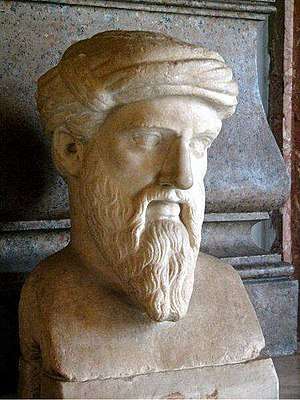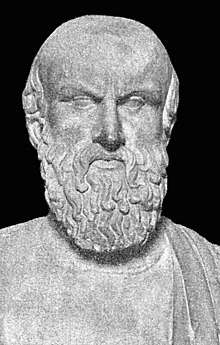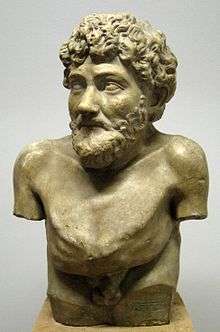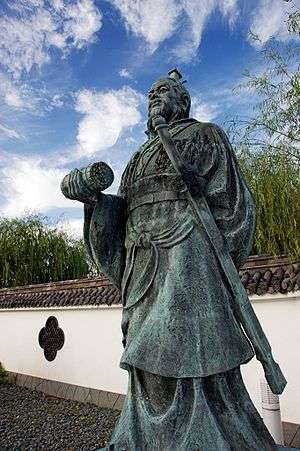6th century BC
The 6th century BC started the first day of 600 BC and ended the last day of 501 BC.
| Millennium: | 1st millennium BC |
|---|---|
| Centuries: | |
| Timelines: | |
| State leaders: | |
| Decades: | |
| Categories: | Births – Deaths Establishments – Disestablishments |
This century represents the peak of a period in human history popularly known as Axial Age. This period saw the emergence of five major thought streams springing from five great thinkers in different parts of the world: Buddha and Mahavira in India, Zoroaster in Persia, Pythagoras in Greece and Confucius in China. Pāṇini, in India, composed a grammar for Sanskrit, in this century or slightly later.[1] This is the oldest still known grammar of any language.
In Western Asia, the first half of this century was dominated by the Neo-Babylonian or Chaldean empire, which had risen to power late in the previous century after successfully rebelling against Assyrian rule. The Kingdom of Judah came to an end in 586 BC when Babylonian forces under Nebuchadnezzar II captured Jerusalem, and removed most of its population to their own lands. Babylonian rule was ended in the 540s by Cyrus, who founded the Persian Empire in its stead. The Persian Empire continued to expand and grew into the greatest empire the world had known at the time.
In Iron Age Europe, the Celtic expansion was in progress. China was in the Spring and Autumn period.
- Mediterranean: Beginning of Greek philosophy, flourishes during the 5th century BC
- The late Hallstatt culture period in Eastern and Central Europe, the late Bronze Age in Northern Europe
- East Asia: the Spring and Autumn period. Confucianism, Legalism and Moism flourish. Laozi founds Taoism
- West Asia: During the Persian empire, Zoroaster, a.k.a. Zarathustra, founded Zoroastrianism, a dualistic philosophy. This was also the time of the Babylonian captivity of the ancient Jews.
- Ancient India: the Buddha and Mahavira found Buddhism and Jainism respectively
- The decline of the Olmec civilization in Central America
Events
590s BC
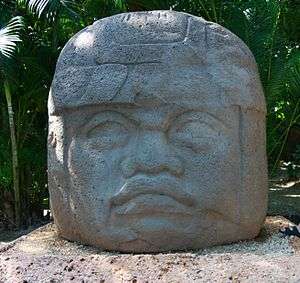
- Mid-6th century BC: Foundation of Temple of Olympian Zeus (Athens).
- 598 BC: Jehoiachin succeeds Jehoiakim as King of Judah.
- 16 March 597 BC: Babylonians capture Jerusalem, replace Jehoiachin with Zedekiah as king.
- 595 BC: Psammetichus II succeeds Necho II as King of Egypt.
- 594 BC: Solon appointed Archon of Athens; institutes democratic reforms.
- 590 BC: Egyptian army sacks Napata, compelling the Cushite court to move to a more secure location at Meroe near the sixth Cataract.[2]
580s BC
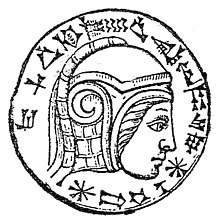
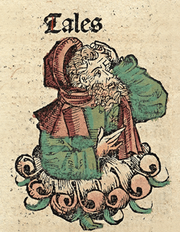
- 589 BC: Apries succeeds Psammetichus II as King of Egypt.
- 588 BC: Nebuchadrezzar II of Babylon begins siege of Jerusalem; some sources set the date at 587 BC.
- 587 BC/586 BC: Jerusalem falls to the Babylonians, ending the Kingdom of Judah. The conquerors destroy Solomon's Temple and exile the land's remaining inhabitants. Babylonian Captivity for the Jews begins.
- 586 BC: death of King Ding of Zhou, King of the Zhou Dynasty of China
- 28 May 585 BC: A solar eclipse occurs as predicted by Thales, while Alyattes is battling Cyaxares. This leads to a truce. This is one of the cardinal dates from which other dates can be calculated.
- 585 BC/584 BC: Astyages succeeds Cyaxares as King of the Medes.
- 585 BC: King Jian of Zhou becomes King of the Zhou Dynasty.
- 583 BC: The Babylonians begin a siege against Tyre.
- 582 BC: Pythian Games founded at Delphi (traditional date).
- 580 BC: Cambyses I succeeds Cyrus I as King of Anshan and head of the Achaemenid dynasty (approximate date).
- 580 BC: Isthmian Games founded at Corinth (traditional date)
570s BC
- 579 BC: Servius Tullius succeeds the assassinated Lucius Tarquinius Priscus as King of Rome (traditional date).
- 573 BC: Nemean Games founded at Nemea (traditional date).
- 572 BC: Death of King Jian of Zhou, King of the Zhou Dynasty of China.
- 571 BC: King Ling of Zhou becomes King of the Zhou Dynasty of China.
- 570 BC: Amasis II succeeds Apries as King of Egypt.
- 570 BC: Pythagoras of Samos is born (approximate date).
- 570 BC: End of the Babylonian siege against the city of Tyre with a partial victory by the Babylonians. It was the longest siege of the city in history, lasting 13 years.
560s BC
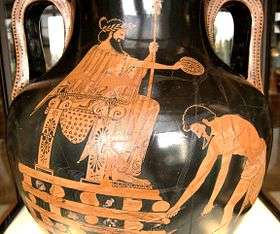
- 568 BC: Amtalqa succeeds his brother Aspelta as King of Kush.
- 562 BC: Amel-Marduk succeeds Nebuchadnezzar as King of Babylon.
- 560 BC: Neriglissar succeeds Amel-Marduk as King of Babylon.
- 561 BC/560 BC: Croesus becomes King of Lydia.
- 560 BC: Pisistratus seizes the Acropolis of Athens and declares himself tyrant. He is deposed in the same year.
550s BC
- 550s BC: Carthage conquers Sicily, Sardinia and Corsica.
- 559 BC: King Cambyses I of Anshan dies and is succeeded by his son Cyrus II the Great.
- 558 BC: Hegesias removed as Archon of Athens.
- 558 BC: The Chinese state of Jin defeats its rival Qin in battle.
- 556 BC: Pisistratus is exiled from Athens to Euboea.
- 556 BC: Labashi-Marduk succeeds Neriglissar as King of Babylon.
- 556 BC/555 BC: Nabonidus succeeds Labashi-Marduk as King of Babylon.
- 550 BC: Abdera is destroyed by the Thracians.
- 550 BC: Cyrus II the Great overthrows Astyages of the Medes, establishing the Persian Empire.
- 550 BC: The Late Mumun Period begins in the Korean peninsula.
540s BC
- 547 BC: Croesus, Lydian King, is defeated by Cyrus of Persia near the River Halys.
- 546 BC: Cyrus of Persia completes his conquest of Lydia, and makes Pasargadae his capital.
- 544 BC: People of Teos migrate to Abdera, Thrace to escape the yoke of Persia.
- 544 BC: King Jing of Zhou becomes King of the Zhou Dynasty of China.
- 543 BC: Prince Vijaya establishes a Sinhalese dynasty of Sri Lanka.
- 543 BC: Pisistratus, tyrant of Athens, purifies the island of Delos (approximate date).
- 540 BC: Greek city of Elea of southern Italy founded (approximate date).
- 540 BC: Persians conquer Lycian city of Xanthos, now in southern Turkey (approximate date).
530s BC
- 539 BC: Babylon is conquered by Cyrus the Great, defeating Nabonidus.
- 538 BC: Return of some Jews from Babylonian exile who build the Second Temple about fifty years after the destruction of the First Temple, from 520 BC–516 BC.
- 537 BC: Jews transported to Babylon are allowed to return to Jerusalem, bringing to a close the Babylonian captivity.
- 536 BC: According to tradition, the Biblical prophet Daniel receives an angelic visitor.[3]
- 534 BC: Lucius Tarquinius Superbus becomes King of Rome.
- 534 BC: Competitions for tragedy are instituted at the City Dionysia festival in Athens.
- 530 BC: Cambyses II succeeds Cyrus as King of Persia.
520s BC
- 528 BC: Gautama Buddha attains Enlightenment, and begins his ministry. He founds Buddhism in India. It becomes a major world religion.
- 526 BC: Psammetichus III succeeds Amasis II as King of Egypt.
- 525 BC: Cambyses II, ruler of Persia, conquers Egypt, defeating Psammetichus III. This is considered the end of the Twenty-sixth Dynasty, and the start of the Twenty-seventh Dynasty.
- 522 BC: Smerdis succeeds Cambyses II as ruler of Persia.
- 522 BC: Babylon rebels against Persian rule.
- 521 BC: Darius I succeeds Smerdis as ruler of Persia.
- 521 BC: The Babylonian rebellion against Persian rule is suppressed
- 520 BC: King Dao of Zhou becomes King of the Zhou Dynasty of China but dies before the end of the year
- 520 BC: Cleomenes I succeeds Anaxandridas II as King of Sparta (approximate date)
510s BC
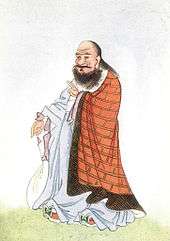
- 519 BC: King Jing of Zhou becomes King of the Zhou Dynasty of China.
- 516 BC: Indian subcontinent—Occupation of Punjab is completed by the Achaemenid King Darius I.
- 12 March 515 BC: Construction is completed on the Temple in Jerusalem.
- 514 BC: King Helü of Wu establishes the "Great City of Helü", the ancient name for Wuxi, as his capital in China.
- 513 BC: Darius the Great subdues the Getae and east Thrace in his war against the Scythians.
- 512 BC: The Kingdom of Macedonia, under King Amyntas I, becomes a vassal state to the Achaemenid Empire.
- 510 BC: Hippias, son of Pisistratus and tyrant of Athens, is expelled by a popular revolt supported by Cleomenes I, King of Sparta and his forces.
- 510 BC: End of reign of Lucius Tarquinius Superbus, last King of the traditional seven Kings of Rome.
- 510 BC: Establishment of the Roman Republic.
- 510 BC: Demaratus succeeds Ariston as King of Sparta (approximate date).
500s BC
- 13 September 509 BC: The Temple of Jupiter on Rome's Capitoline Hill is dedicated on the Ides of September.
- 508 BC: Office of pontifex maximus created in Rome.
- 507 BC: Cleisthenes, Greek reformer, takes power and increases democracy.
- 506 BC: Battle of Boju: Forces of the Kingdom of Wu under Sun Tzu defeat the forces of Chu.
- 505 BC: First pair of Roman consuls elected.
- 4 December 502 BC: Solar eclipse darkens Egypt (computed, no clear historical record of observation).
- 502 BC: The Latin League defeats the Etruscans under Lars Porsena at Aricia.
- 502 BC: Naxos rebels against Persian domination sparking the Ionian Revolt.
- 501 BC: Cleisthenes reforms democracy in Athens.
- 501 BC: Naxos is attacked by the Persian Empire.
- 501 BC: In response to threats by the Sabines, Rome creates the office of dictator.
- 501 BC: Confucius is appointed governor of Chung tu.
- 501 BC: Gadir (present-day Cádiz) is captured by Carthage (approximate date).
- 500 BC: Bantu-speaking people migrate into south-west Uganda from the west (approximate date).
- 500 BC: Refugees from Teos resettle Abdera.
- 500 BC: Darius I of Persia proclaims that Aramaic be the official language of the western half of his empire.
- 500 BC: Signifies the end of the Nordic Bronze Age civilization in Oscar Montelius periodization system and begins the Pre-Roman Iron Age.
- 500 BC: Foundation of first republic in Vaishali Bihar India.
Significant people
Political leaders
- Amyntas I, King of Macedonia
- Astyages, King of Medes
- Bias of Priene, Greek sage
- Callimachus, Athenian general
- Cambyses II, King of Persia
- Chilon of Sparta, Greek sage
- Cleisthenes, Tyrant of Athens
- Cleomenes I, King of Sparta
- Croesus, King of Lydia
- Cyaxares, King of Medes
- Cyrus the Great, King of Persia
- Darius I, King of Persia
- Epimenides, Greek seer
- Gorgo, Queen of Sparta
- King Helü of Wu, King of Wu
- Lucius Junius Brutus, co-founder of the Roman Republic
- Lucius Tarquinius Superbus, King of Rome
- Miltiades, Athenian general and politician
- Nabonidus, the last King of Babylon
- Nebuchadnezzar, King of Babylon
- Necho II, Pharaoh of Egypt
- Pisistratus, tyrant of Athens
- Periander, Tyrant of Corinth
- Pittacus of Mytilene, Greek politician
- Psammetichus III, Pharaoh of Egypt
- Servius Tullius, King of Rome
- Solon, Athenian statesman
Arts and entertainment
- Ageladas, Greek sculptor
- Epiktetos, Greek vase painter
- Exekias, Greek vase painter
- Kleitias, Greek vase painter
- Kritios, Greek sculptor
- Lydos, Greek vase painter
- Nearchos, Greek vase painter
- Nikosthenes, Greek vase painter
- Oltos, Greek vase painter
- Phintias, Greek vase painter
- Psiax, Greek vase painter
Literature
- Aeschylus, Greek playwright
- Aesop, Greek fabulist
- Alcaeus of Mytilene, Greek poet
- Anacreon, Greek poet
- Cleobulus, Greek poet
- Corinna, Greek poet
- Epimenides, Greek poet
- Ibycus, Greek poet
- Theognis of Megara, Greek poet
- Thespis, founder of Greek theatre
- Pāṇini, Indian linguist
- Pindar, Greek poet
- Sappho, Greek poet
- Stesichorus, Greek poet
- Simonides of Ceos, Greek poet
- Sun Tzu, Chinese writer and general
Philosophy and religion
- Anaximander, Greek philosopher
- Anaximenes of Miletus, Greek philosopher
- Confucius, founder of Confucianism
- Gautama Buddha, founder of Buddhism
- Ezekiel, Hebrew prophet
- Heraclitus, Greek philosopher
- Hippasus, Greek philosopher
- Laozi, founder of Taoism
- Mahavira, founder of Jain philosophy
- Pherecydes of Syros, Greek philosopher
- Pythagoras, Greek philosopher, mathematician
- Scylax of Caryanda, Greek explorer
- Thales, Greek mathematician
- Xenophanes, Greek philosopher
- Zoroaster, founder of Zoroastrianism
- Ajita Kesakambali, Indian Philosopher and first recorded Atheist
Sports
- Arrhichion, Greek pankratiast
- Cimon Coalemos, Greek chariot racer
- Epitelidas of Laconia, Greek runner
- Glycon of Croton, Greek runner
- Milo of Croton, Greek wrestler
- Phanas of Pellene, Greek runner
- Pythagoras of Samos, Greek boxer
- Timasitheus of Delphi, Greek pankratiast
Inventions, discoveries, introductions
- First archaeological surveys of the Arabian peninsula by Babylonian King Nabonidus
- Sunshu Ao (孫叔敖), China's first hydraulic engineer, creates an enormous artificial reservoir by damming a river for a massive irrigation project while employed in the service of King Zhuang of Chu (died 591 BC)
- Lost-wax casting is spread to Ancient Greece
Sovereign States
See: List of sovereign states in the 6th century BC.
References
- Ritual and mantras: rules without meaning Google Books
- "History of the SUDAN". www.historyworld.net. 2007. Archived from the original on 14 July 2007. Retrieved 3 August 2007.
- Daniel 10:4 Bible Online
Books
- Anhui Provincial Institute of Cultural Relics and Archaeology and Bengbu Museum (June 2015). "The Excavation of the tomb of Bai, Lord of the Zhongli State". Chinese Archaeology. Berlin, Boston: Walter de Gruyter. 14 (1): 62–85. doi:10.1515/char-2014-0008.




